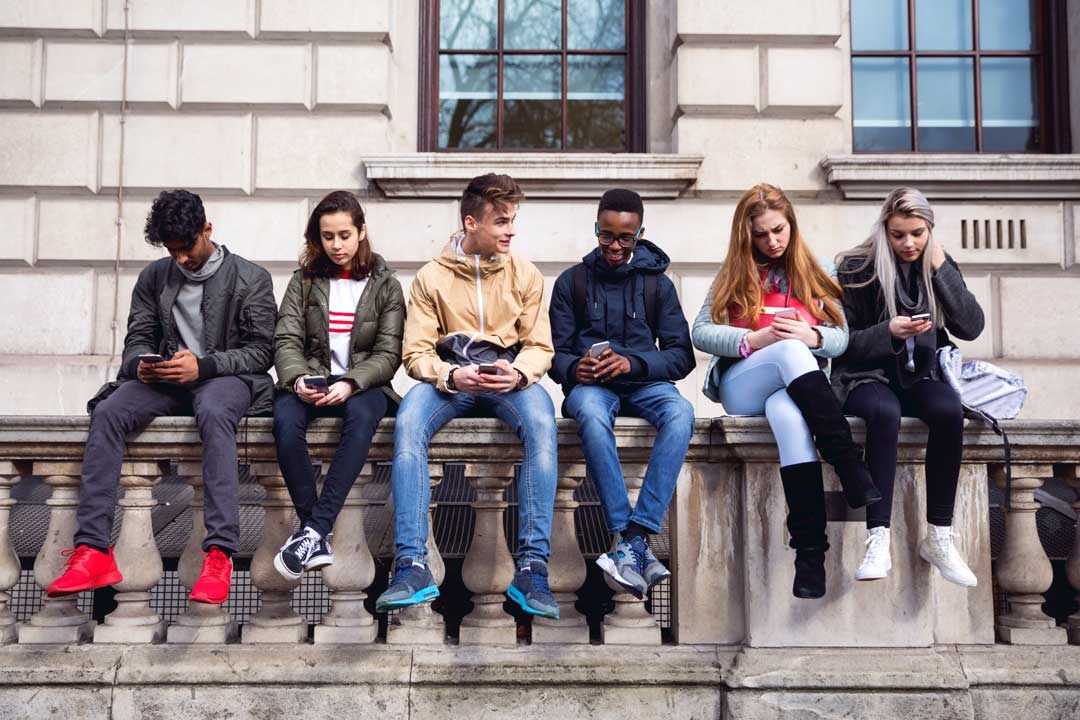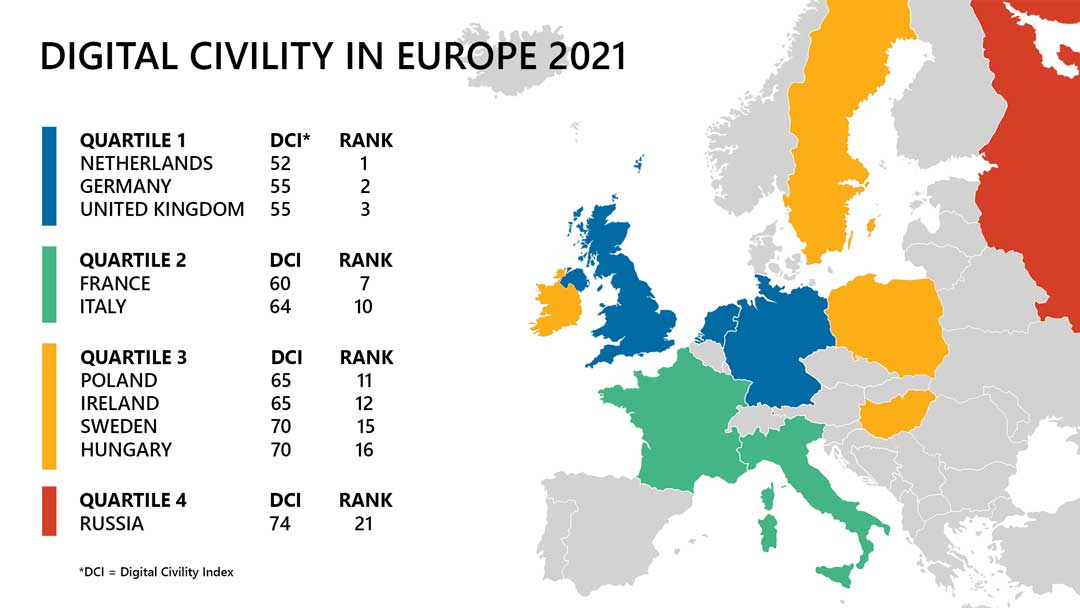In the spirit of this year’s Safer Internet Day theme – “Together for a Better Internet,” Microsoft is releasing the latest results from our sixth annual digital civility study, Civility, Safety & Interaction Online, as well as a newly updated “Digital Civility Index” (DCI) score. At Microsoft, we are committed to driving progress toward a safer, more civil internet, engaging with leading digital safety organizations, experts, and other stakeholders around Europe to boost citizen awareness and education about online civility. The global survey, conducted in 22 countries – including ten European countries – polled teens aged 13-17 and adults aged 18-74 about their exposure to 21 online risks across four categories (reputational, behavioural, sexual, and personal/intrusive[i]), their experiences of life online (including during the pandemic) and how interactions in those areas have impacted their perception of online civility. Their responses helped generate this year’s DCI score.
Digital Civility in Europe
This year’s global DCI score stands at 65 per cent – the best it has been since the survey began in 2016. This overall score also marks a two per cent improvement since 2020. Of the 22 countries surveyed, the Netherlands leads the way, with Germany, France, the UK, and Italy also appearing in the top ten. The DCI score is calculated on a scale from zero to 100 – the lower the index reading, the lower respondents’ risk exposure, and the higher the perceived level of online civility.
[To view your country’s DCI score and other key statistics, check out our country-level data summaries (including those for France, Germany, Hungary, Ireland, Italy, the Netherlands, Poland, Russia, Sweden, and the UK).]
Women experience more negative interactions
This year’s DCI improvement was driven by teen boys and male respondents, who generally reported being less exposed to online risks than in previous years. For instance, teen boys saw a five per cent decrease in trolling and unwanted sexting, and a three per cent decrease in hate speech compared to last year.
Unfortunately, women, both teens and adults, reported being more exposed to online risks than ever before. Women experienced almost 60 per cent of all risks – an all-time high – and were more likely to have experienced consequences, worry, or pain as a result.
This year’s findings also underscore the importance of making high-quality, gender-disaggregated data more widely available to track trends, inform policy discussions, and address the experiences of girls and women. That’s why Microsoft has decided to make public the data that underpinned this research, as part of our leadership in the UN Generation Equality Forum.
Education is key to making the internet safer
This year, we also checked in on people’s perceptions of what’s needed to help create a safer online environment for everyone. Nearly 9 out of 10 respondents, across all genders and age groups, stated there’s a need to better educate people on how to make the digital world safer.
At Microsoft, we’ve also benefited from hearing directly from young people about their experiences of digital safety. We’ve created the Microsoft Council for Digital Good Europe: bringing together teens aged 13-17 from ten European countries to explore themes relating to cyber-bullying, hate speech, sexploitation, terrorism and violent or extreme content, cybersecurity, and privacy. They engaged with digital safety experts from e-enfance France, INCIBE Spain, the Centro Internet Seguro in Portugal, the TOM national helpline in Slovenia, The Diana Award in the UK, the Institute for Strategic Dialogue, and ECPAT, as well as digital and children’s rights experts from the Council of Europe. The teens then took to the stage to share their thoughts at the World Anti-Bullying Forum in Sweden and during the Internet Governance Forum in Poland.
“At INCIBE and Internet Segura for Kids (the Safer Internet Centre of Spain), we work to protect young users and encourage safe practices online. During Safer Internet Day 2022, we will hear directly from young people taking part in Microsoft’s Council for Digital Good and the Youth Panel from Childhood Platform Spain, about their needs and pledges for a more respectful and enjoyable digital world.” – Cristina Gutiérrez Borge, Cybersecurity for Minors, INCIBE
All Council for Digital Good Europe members continue to promote digital safety, online accountability and greater empathy in their schools and community, to ensure their learnings last long after the end of Safer Internet Day 2022.
“I am really enjoying the Microsoft Council for Digital Good Europe program so far while acting as the representative for France. It has been an enriching experience to hear from students and professionals around Europe about what the digital climate presents in their countries.” – Alex Mourad, France (15 years), Council for Digital Good Europe
Protecting people online demands policy change
Technology companies have a responsibility to work policymakers to ensure that online risks are mitigated for young users. The EU is leading the way in setting standards for digital safety, proposing a Digital Services Act, which will facilitate the fight against the detection and prevention of child sexual abuse online, and the implementation of a regulation on countering terrorist content online.
Visit our Online Safety website to discover our online safety resources for advice and guidance on online safety issues, and follow Microsoft Safer Online on Facebook and Twitter.
[i] Reputational – “Doxing” and damage to personal or professional reputations; Behavioral – Being treated meanly; experiencing trolling, online harassment or bullying; encountering hate speech and microaggressions; Sexual – Sending or receiving unwanted sexting messages and making sexual solicitations; receiving unwanted sexual attention and being a victim of sextortion or non-consensual pornography (aka “revenge porn”); and Personal/intrusive – Being the target of unwanted contact, experiencing discrimination, swatting, misogyny, exposure to extremist content/recruiting, or falling victim to hoaxes, scams or fraud.


